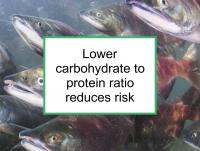A new study has found that rats fed a moderate protein/reduced carbohydrate diet developed fewer mammary tumors when exposed to a known carcinogen than rats fed a low protein/high carbohydrate diet. Tumors were induced in two groups of female Sprague-Dawley rats at 52 days of age by the carcinogen N-methyl-N-nitrosourea.
The rats were then assigned to consume either a low protein/high carbohydrate diet (15% and 60% of calories, respectively) or a moderate protein/reduced carbohydrate diet (35% and 40% of calories) for 10 weeks. All of the animals were fed three meals per day to mimic human patterns.
The number of tumors was found to be lower in the rats on the moderate protein/reduced carbohydrate diet compared to those on the low protein/high carbohydrate diet. No differences were found between the two rat diet groups with respect to tumor size. At three weeks, post-meal blood levels of insulin was observed to be higher in the low protein/high carbohydrate group compared to the moderate protein/reduced carbohydrate group. However, at 10 weeks, there was a trend for insulin-like growth factor-I (IGF-I) to be increased after meals in the moderate protein/reduced carbohydrate group (elevated serum IGF-I has been reported to be associated with increased breast cancer risk in some studies). The authors conclude that the study provides evidence that reducing the dietary carbohydrate to protein ratio reduces the development of mammary tumors, possibly indicating that reducing post-meal insulin release could beneficially alter the proliferative environment required for breast cancer to progress.
Study supports theory that excess insulin promotes breast cancer
The study supports the theory that high circulating insulin, which is associated with metabolic syndrome and which may occur after a meal high in carbohydrates, can promote the development of breast cancer. This appears to be true even for women who are not overweight.
